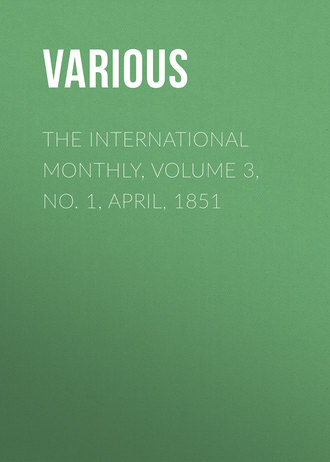 полная версия
полная версияThe International Monthly, Volume 3, No. 1, April, 1851
In the History of Costume in England, by the author of these notes, it has been remarked that the freedom and looseness, as well as ease and elegance of female costume at this period is to be attributed to the taste of Sir Peter Lely, rather than to that exhibited by the Beauties of Charles's court. "It was to his taste, as it was to that of a later artist, Sir Joshua Reynolds, that we are indebted for the freedom which characterized their treatment of the rigid and somewhat ungraceful costumes before them." Walpole, in his "Anecdotes of Painting," says, "Lely supplied the want of taste with clinquant; his nymphs trail fringes, and embroidery, through meadows and purling streams. Vandyke's habits are those of the times; Lely's, a sort of fantastic night-gown fastened with a single pin." Lely's ladies are not unfrequently en masque, and are habited in the conventional dresses adopted for goddesses in the court of Versailles.
8
Nell appears to have first fixed the attention of the King by appearing at the King's Theatre in an Epilogue written for her by Dryden; who, taking a pique at the rival theatre, when Nokes, the famous comedian, had appeared in a hat of large proportions, which mightily delighted the silly and volatile frequenters of the place, brought forward Nell in a hat as large as a coach-wheel, which gave her short figure so grotesque an air, that the very actors laughed outright and the whole theatre was in convulsions of merriment. His Majesty was nearly suffocated by the excess of his delight; and the naïve manner of the actress, her wit, archness, and beauty, received additional zest by the extravagance of "the broad-brimmed hat and waist-belt" in which Dryden had attired her, and which fixed her permanently in the memory of "the merry Monarch."
9
"Improvement" has extended far beyond Old Brompton. The little wooden house of the old rat-catcher has been swept away, and he is obliged to locate himself and his live stock in some back lane, where none but his friends can find him; and as he is disastrously poor, their number is very limited.
10
Then vicar of St. Martin's, and afterwards Archbishop of Canterbury. In that sermon he enlarged upon her benevolent qualities, her sincere penitence, and exemplary end. When, says Mrs. Jameson, this was afterwards mentioned to Queen Mary, in the hope that it would injure him in her estimation, and be a bar to his preferment, "And what then?" answered she, hastily. "I have heard as much; it is a sign that the poor unfortunate woman died penitent; for, if I can read a man's heart through his looks, had she not made a pious and Christian end, the Doctor would never have been induced to speak well of her."
11
We have much yet to do for a class whom it is a shame to name, and that much must be done by women—by women, themselves sans tache, sans reproche. It is not enough that we repeat our Saviour's words, "Go and sin no more:" we must give the sinner a refuge to go to. Asylums calculated to receive such ought to be more sufficiently provided in England. One lady, as eminent for her rare mental powers as for her charity and great wealth, is now trying an experiment that does her infinite honor; she has set a noble example to others who are rich and ought to be considerate; safe in her high character, her self-respect, and her virgin purity, she has provided shelter for many "erring sisters,"—in mercy beguiling
"by gentle ways the wanderer back."Of all her numerous charities, this is the truest and best; like the fair Sabrina she has heard and answered the prayers of those who seek protection from the most terrible of all dangers—
"Listen! for dear honor's sakeListen—and save!"12
Entered according to Act of Congress, in the year 1850, by G. P. R. James, in the Clerk's Office of the District Court of the United States for the Southern District of New-York.
13
Entered according to Act of Congress, in the year 1850, by Stringer & Townsend, in the Clerk's Office of the District Court of the United States for the Southern District of New-York.
14
As the conversations in the rest of this book are supposed to be sometimes in French and sometimes in English, the translator will render the terms of courtesy now by signor, signora, and signorina, and again by monsieur, madame, and mademoiselle.
15
The Comte d'Artois, afterwards Charles X.
16
Thurlow politely calls Kenyon Taffy, because the latter was a Welshman. Scott is Lord Eldon himself.
17
Lives of the Chancellors. Second Series. Vol. v. pp. 644, 664.
18
This custom is prettily related in Auerbach's story of 'Ivo.'
19
Seen through a solar microscope.
20
It need scarcely be observed, that Jackeymo, in his conversations with his master or Violante, or his conferences with himself, employs his native language, which is therefore translated without the blunders that he is driven to commit when compelled to trust himself in the tongue of the country in which he is a sojourner.
21
Mr. Dale probably here alludes to Lord Bolingbroke's ejaculation as he stood by the dying Pope; but his memory does not serve him with the exact words.









